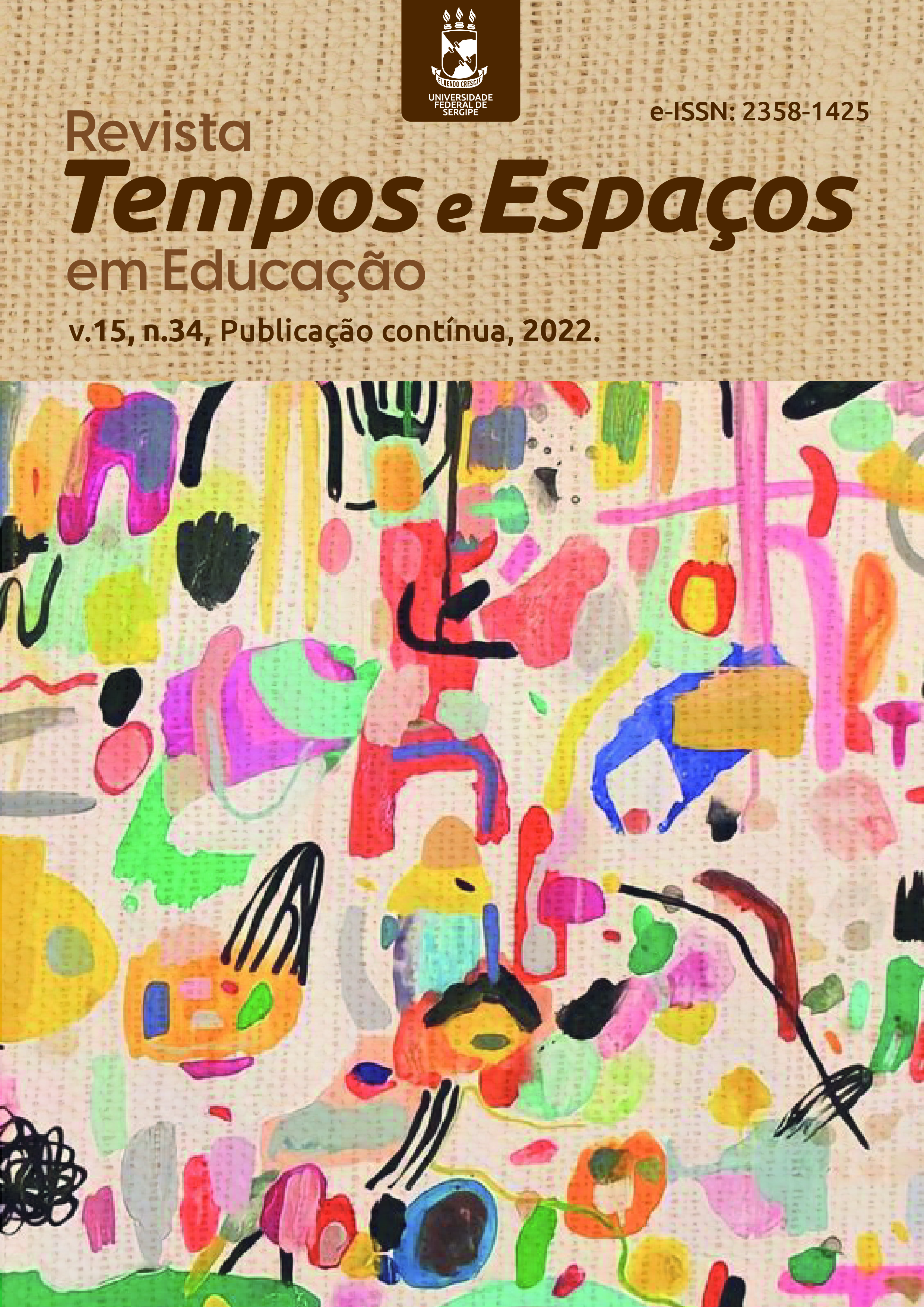Aspectos de leituras de professores de ensino superior para o desenvolvimento profissional contínuo
DOI:
https://doi.org/10.20952/revtee.v15i34.17204Palavras-chave:
Atitude perante a atividade profissional, Autoaperfeiçoamento profissional, Formação avançada, Formação continuada, Motivo para escolha de uma profissãoResumo
O artigo destaca a necessidade de se aumentar a atenção à formação da prontidão dos docentes das instituições de ensino superior para o autodesenvolvimento profissional contínuo. A prontidão do professor para o autoaperfeiçoamento profissional é considerada uma formação pessoal-profissional multifacetada, representada estruturalmente pela unidade de componentes funcionalmente interligados: valor-motivacional, atividade-organizacional; emocional e volitivo; informação-cognitiva, reflexiva-avaliativa. Os critérios para o diagnóstico desse fenômeno são diferenciados: consciência da necessidade de um aprimoramento profissional contínuo e proposital; a formação teórica, o nível de conhecimentos orientados para o profissional, a formação prática e operacional, a formação de competências práticas e capacidades de autoaperfeiçoamento profissional. Um conjunto de qualidades psicológicas individuais importantes para o autodesenvolvimento profissional contínuo e a futura atividade profissional em geral; foco na autoanálise, a autoavaliação da melhoria profissional é analisada. Os níveis de prontidão dos professores para o autoaperfeiçoamento profissional contínuo são determinados e caracterizados: crítico, passivo, básico, ótimo, criativo. Definimos também diversos aspectos de análise e autoanálise da atividade profissional, formação através da organização de atividades interativas orientadas para a personalidade, atualização da experiência profissional dos professores, garantia de uma atitude seletiva perante os problemas, material didático, com enfoque na formação e implementação do programa de autodesenvolvimento pessoal e profissional.
Downloads
Referências
Adamenko O. (2013). Methodology of forming the source base of historical and pedagogical research. Pedagogical discourse. Vol. 15. pp. 10-13.
Antonova O. (2014). Professional self-improvement of the future teacher through the development of his/her abilities and talents. New learning technologies: Scientific method, coll. / Institute of Innovative Technologies and Content of Education of the Ministry of Education and Science, Youth and Sports of Ukraine. pp.8-13
Artemova L., Kosenko Y. (2000.) Model of degree training of preschool education specialists in higher educational institutions. Psychological and pedagogical problems of teacher training in the conditions of social transformation: materials of intern. scientific-theoretical conf. to the 80th anniversary of the NPU Dragomanova. Kyiv. Vol. 1. pp. 84-86.
Avshenyuk N., Kostina L. (2014). Teacher professional development as a problem of comparative pedagogy. Comparative professional pedagogy. No.4 (2), рр.150-156.
Dvichuk D. (2006). Principles of management and choice of goals of the educational system in the context of the European dimension. Higher education in Ukraine. No.2,рр.20-26.
Dychkovska I. (2015). Innovative pedagogical technologies. Kyiv: Akademvydav, 302 p.
Fritsyuk V. A. (2017). Theoretical and methodical bases of preparation of future teachers for continuing professional self-development.Thesis.Vinnytsia. 532 p.
Gladkova V. (2007). Fundamentals of Acmeology.New World.320 p.
Gorodyska O. (2016). Formation of students' needs for professional self-improvement. Bulletin of the National Technical University of Ukraine "Kyiv Polytechnic Institute". Series: Philology. Pedagogy. Vol.. 8. pp. 65-69.
Hager Paul. (1998). Is there a cogent philosophical argument against competency standards? Philosophy of Education: Major Themes in the Analytic: Problems of Educational Content and Practices. Ed. by Hirst H.Paul and White Patricia. Florence, KY, US: Routledge. Vol. 4. рр. 399-415.
Ivakh S. (2014). Professional self-education and self-development of future preschool educators. Scientific notes of the department of pedagogy. Vol. 34. pp. 87-94.
Kuzhelny A. (2013). The problem of students' readiness for self-development in the field of vocational education. Bulletin of Chernihiv National Pedagogical University. Pedagogical sciences. Vol. 108.2. http://nbuv.gov.ua/UJRN/VchdpuP_2013_2_108_41
Loseva N. (2004). Self-improvement of the teacher. Donetsk: DonNU, 300 p.
Maslov V.I., Bodnar O.S., Gorash K.V. (2012). Scientific bases and technologies of competent management of a general educational institution: monograph. Ternopil: Krok, 320 p.
Maslow A. (1994). Self-actualization of personality and education / Translated. in English Kyiv: Donetsk, 52 p.
Mulder M. (2016). Competence-based Vocational and Professional Education. Springer. 142 р.
Oliynyk V., Otych O. (2015). Postgraduate pedagogical education in the context of global civilization changes. Higher education of Ukraine in the conditions of globalization of society: monograph. Kyiv, 300 p.
Omarova Yessen B. (2016). Toktarbayeva Darkhan Gabdyl-Samatovich Methods of forming professional competence of students as future teachers. International journal of environmental & science education. Vol. 11. No. 14. рр. 651–662.
Parry S. B. (1991). The quest for competencies: competency studies can help you make HR decisions, but the results are only as good as the study. New York. 48 p.
Pavlyukh V. (2015). Theoretical principles of teacher self-improvement as a factor of professional growth in terms of educational change. Pedagogical Bulletin. Vol.2-3. pp. 68-73.
Raven J. (1984). Competence in Modern Society: Its Identification, Development, and Release. Oxford: Oxford Psychologists Press. 63 p.
Rodgers K. R. & Freiberg, J. (2002). Freedom to learn. M.: Meaning. 168 р.
Semichenko V. (2001). Psychological aspects of professional training and postgraduate education of teachers. Postgraduate education in Ukraine. No.2. рp. 54-57.
Spencer L. M., Spencer S. M. (1993). Competence at work: models for superior performance. New York: John Wiley. pp. 13-26.
Sysoeva S. O. (2000). Technologization of educational activity in the conditions of continuing professional education. Continuing professional education: problems, searches, prospects: monograph; for order. I.A. Zyazyun. Kyiv: VIPOL. pp. 249-273.
Zyazyun I. A. (2000). Continuing education: conceptual principles and modern technologies. Creative personality in the system of continuing professional education: materials of international Science. conf. (May 16-17, 2000, Kharkiv); for order. S.O. Sysoeva and O.G. Romanovsky. Kharkiv: KhDPU, рр. 8-16.
Zyazyun L. I. (2006). Self-development of the individual in the educational system of France: a monograph. Kyiv; Nikolaev: Publishing house of Moscow State University named after Petro Mogyla, 388 p.
Downloads
Publicado
Como Citar
Edição
Seção
Licença
À Revista Tempos e Espaços em Educação ficam reservados os direitos autorais pertinentes a todos os artigos nela publicados. A Revista Tempos e Espaços em Educação utiliza a licença https://creativecommons.org/licenses/by/4.0/ (CC BY), que permite o compartilhamento do artigo com o reconhecimento da autoria.



